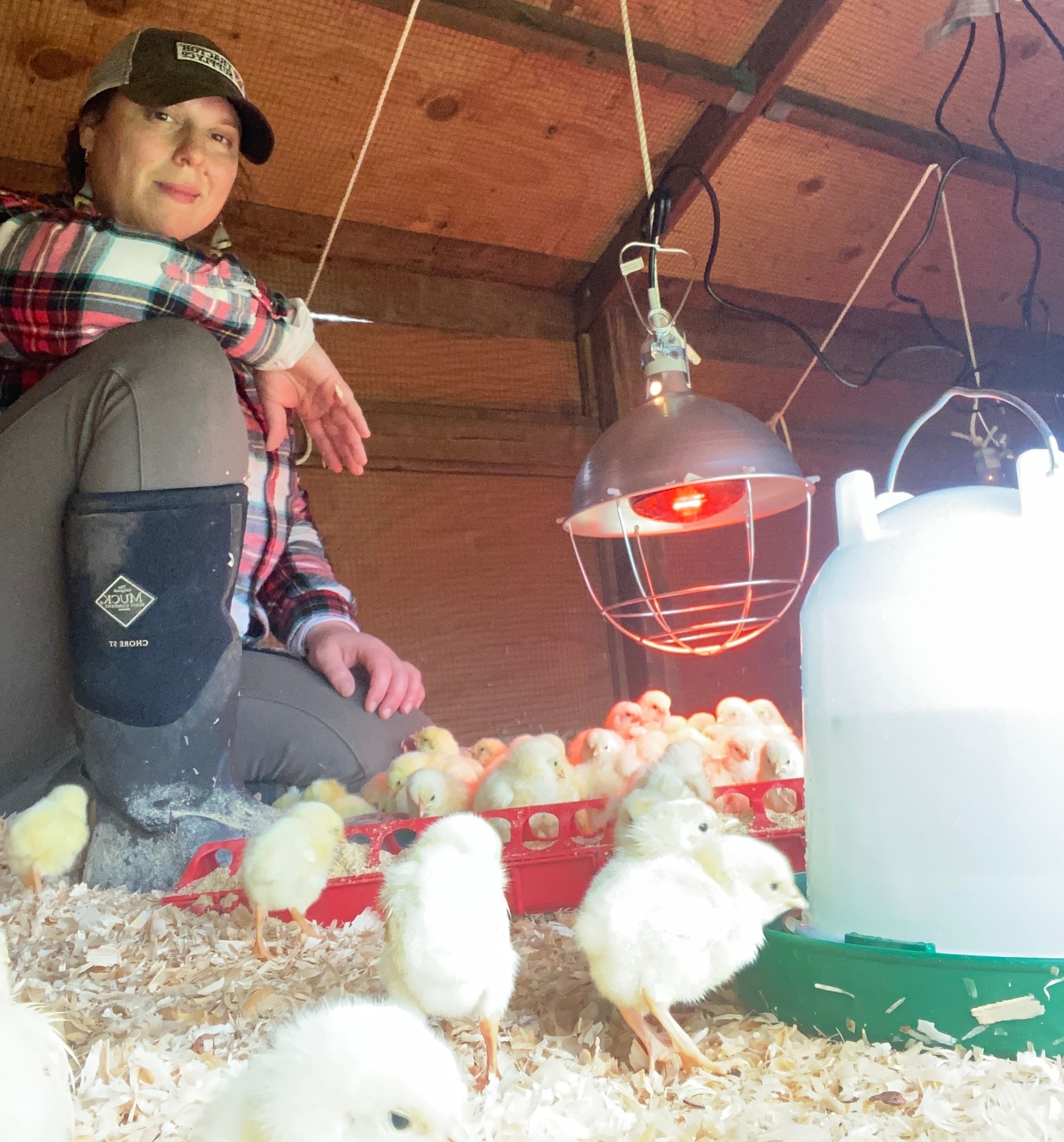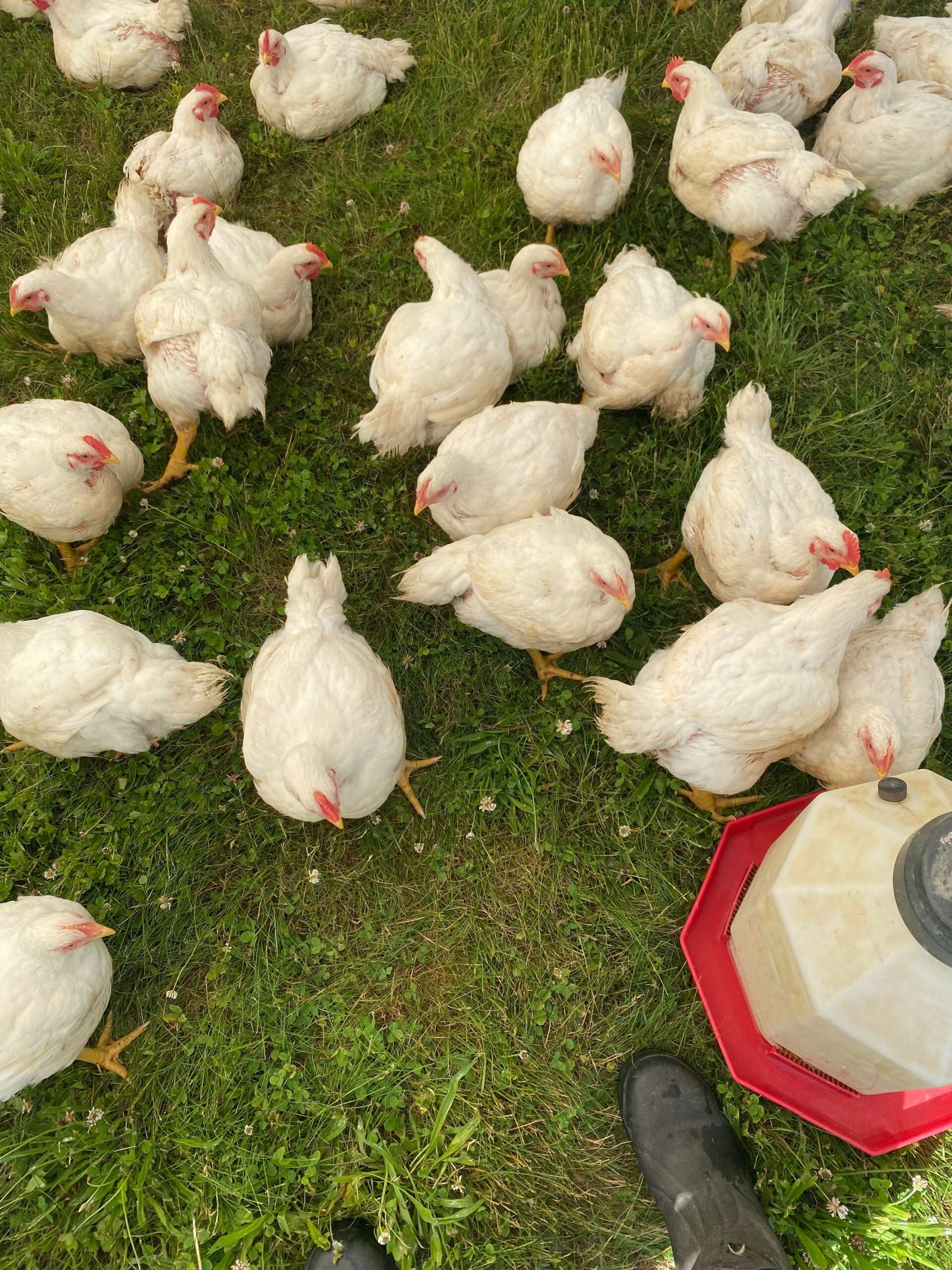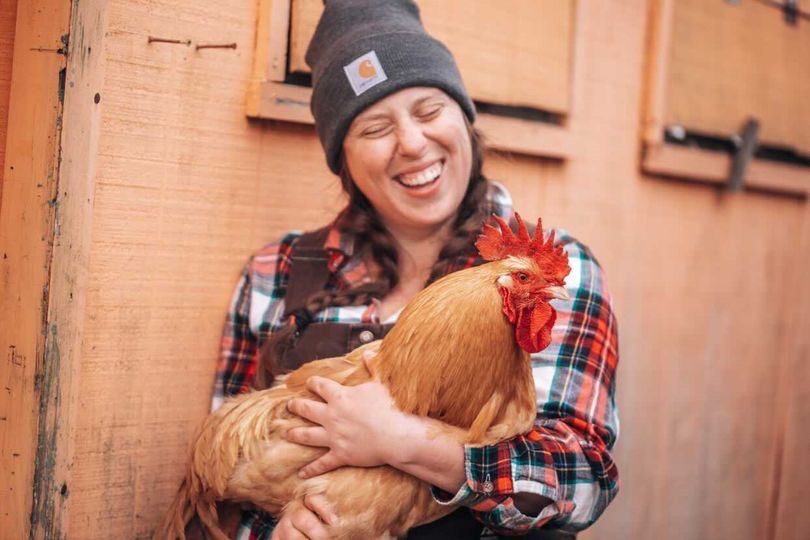We caught up with the brilliant and insightful Abra Morawiec a few weeks ago and have shared our conversation below.
Abra, thanks for taking the time to share your stories with us today One of the toughest parts of scaling a business is maintaining quality as you grow. How have you managed to maintain quality? Any stories or advice?
In our industry, relationships with other business owners who share similar ethics in animal husbandry and cleanliness is paramount to maintain high quality of product. For the first eight years of Feisty Acres’ existence, Chris and I harvested and processed all of our own poultry in addition to hatching and caring for our birds. It was an extraordinary amount of work, but because we were small starting out it made sense for us to handle that aspect of the farm business. It also allowed us to have an intimate understanding of quality for our poultry products as they made their way from our farm to the tables of our customers.
The end of 2023 and the beginning of 2024 has brought about incredible and exciting changes to our farm, including the opportunity for us to expand exponentially. Last season, we harvested and sold over 3,500 meat birds and this year we intend to raise anywhere between 8,000 – 10,000 meat birds. This jump in our farm’s production means that we now have to outsource aspects of our business–and we’ve decided to outsource the harvest, processing, and packaging of our birds.
Chris and I spent two months earlier this year visiting USDA (United States Department of Agriculture) inspected poultry processing facilities in the area because we wanted to be sure that our birds are handled with the same care they receive during their life on the farm. We finally settled upon an Amish owned facility, just a quick twenty minute drive from our operation. The processing team allowed us to view their facility in action and we were pleased with what we saw: temperature controlled holding area for the birds; gentle yet efficient handling of the birds; stunningly clean equipment; and beautifully packaged end products. And the cherry on top: an ultra modern air chilling facility that cools down the processed birds without adding extra water weight or other solutions. They even gifted us samples of their work such as bone-in chicken breast, pot pies, and chicken nuggets all made on site with natural ingredients.
Being able to feed our customers’ family and friends is an immense privilege that we don’t ever take for granted. So, it is our responsibility to create partnerships with others in our agricultural landscape who share our ideals and perspectives on raising birds with the utmost efficacy.

Abra, love having you share your insights with us. Before we ask you more questions, maybe you can take a moment to introduce yourself to our readers who might have missed our earlier conversations?
The enjoyment of food and my fascination with how it’s prepared has always taken up a large amount of my life. As a baby, my father tells me that my first word was “cookie.” I was practically doomed from the start! During my early childhood, we lived in Orange County New York where we had a small flock of backyard chickens and ducks. Some years there was garden, others there wasn’t. We had fruit trees and I remember very clearly jars of brandied pears shelved above the cabinets of our kitchen that my dad had made. I also always loved going grocery shopping with my father and he taught me all about the importance of quality–how to pick out produce; select a steak; reading ingredient labels. His father, my grandfather, owned a small grocery store in Boro Park Brooklyn before I was born and my father and his oldest brother worked for him there when they were kids. As I got older, my grandmother used to ask for my help in the kitchen during preparation for our weekend dinners. I still have her “Joy of Cooking” book from the late 80’s that includes all of her hand written notes and miscellaneous recipes scotch taped to the inside cover. Through college I worked at a high end Japanese fusion and sushi restaurant in Manhattan. The executive chef made regular trips to the Union Square Greenmarket and I learned so much about the importance of sourcing fresh, high quality produce and animal products and how that directly correlates to the success of a restaurant business. It wasn’t until I left the United States in 2009, however, that I became interested in how the ways in which food is raised and grown affect the taste and quality of what we eat.
Before founding Feisty Acres with Chris I acquired my farming chops working for a variety of different agricultural operations both domestic and abroad. I was first introduced to agriculture on a large scale while serving as a volunteer for the United States Peace Corps in Mali, West Africa. I initially served in the Peace Corps to gain experience to work for the State Department, but as I spent two years working and living on the northern edge of Dogon Country, my perspective began to change. I lived in a rural village called Mougui, which had a population of around 250 people. Every family had a plot of land to farm outside the village proper so that they could provide for themselves year round. During the growing season, which was late May through September/October, I worked in the fields with my host family and acquired a renewed love for making plants grow. I learned the life cycles of millet, sorghum, and various other staples such as cassava root and cowpeas. The gardening association invited me to help in their market gardens, which included a variety of onion specific to the Dogon region among many other delights: mangos; guavas; tamarind; hibiscus; garlic and okra. I also spent time with a local herdsman, who cared for over 200 goats and sheep, during lambing and kidding season. He taught me how to milk by hand, assist in breach births, and what to look for in a ewe (female sheep) or a doe (female goat) for good breed stock.
As my service came too a close, I met folks who worked for the State Department in the capital city of Bamako and–spoiler alert–I was completely put off by the way they spoke of and treated the folks of Mali. But my desire to become involved in the food system in America had been awakened and when I returned home to Brooklyn in 2011, my search for a way in began.
It wasn’t until 2012 that Chris, my partner in life and business, and I crossed paths as apprentices at a commercial organic vegetable farm on the North Fork of Long Island. While we worked together moving irrigation pipe, running tractor mounted transplanters, and harvesting vegetables for market, we shared our food, farm and business ideals and realized there was a lot in common between us. As we continued to work and manage other people’s farms, we couldn’t shake the idea of one day striking out on our own. And, inevitably as most good stories go, we fell in love.
It was a cold and snowy afternoon in February of 2015 when Chris and I began work on our business plan that would be born into Feisty Acres that fall. Pasture raised quail and other specialty poultry and game birds were on our minds as the main revenue source in addition to eggs and perhaps some value added products. Demand was strong in the local markets: with pasture raised broiler chickens already popular with the general public, people who were interested in more unusual offerings came out of the woodwork with their requests. French guinea hen; quail; and heritage breed turkeys were all up for discussion to be included in our future plans. My boss and mentor at the time, Phil Barbato of Biophilia Organic Farm, offered us up to five acres to start our business on the North Fork of Long Island and the rest is history. We now steward nearly 30 acres in Schoharie County, New York and hope to expand even more as the years go by with greater access to affordable farm land, infrastructure, and other agricultural resources here.
We sell our poultry, eggs, and other products through our monthly farm membership/CSA program and at the NYC Greenmarkets: Union Square on Wednesdays in Manhattan and Grand Army Plaza in Brooklyn on Saturdays. Within the next year or so, we aim to ship our goods across the country.

How about pivoting – can you share the story of a time you’ve had to pivot?
When we founded Feisty Acres in 2015, we were a certified organic farm operation. We’re not anymore.
Being the first, certified organic farm to offer pasture raised quail in New York State (second in the country) was quite a feather in our cap. We received our certification from the Northeast Organic Farming Association of New York (NOFA-NY) in October of 2015 one month before our very first harvest of pasture raised quail for the Thanksgiving holiday. From chick to plate our birds fell into the certified organic supply chain: they were raised under NOP poultry regulations from 48 hours old until their harvest date and they were processed and packaged by us in a certified organic facility that we leased from a neighboring poultry farm on Long Island. The inspector who oversaw the certification of our farm was thorough, friendly, and professional. That year’s very first harvest was only about 100 quail, but we quickly expanded our business as word got out about the excellence of the product we offered.
As Chris and I looked to grow our poultry business, it became very clear that scaling up a small, certified organic poultry farm was costly. Our feed, which was the largest expense for our business, was certified organic and cost upwards of 50% more than non-organic feed. Another issue for us was that no one locally offered certified organic feed in the larger quantities we needed—so we had to source from a farm in Pennsylvania. This was a huge source of frustration for us as we wanted to utilize the family owned feed mill located on Long Island just 30 minutes away from our farm, but we were not able to because they did not mill or bag certified organic feed for poultry. Under the poultry regulations of the NOP, certified organic poultry must consume only certified organic feed, food scraps, etc. To preserve our certified organic status, we had to freight in feed from another state rather than purchase high-quality, non-organic feed from the mill a couple towns over. We looked to perhaps supplement some of those feed rations with food scraps from local grocery stores and restaurants. The idea of food not fit for human consumption going towards producing delicious poultry and eggs rather than going to a landfill seemed like a no brainer! Unfortunately for us, however, because we couldn’t 100% guarantee that every morsel of food was certified organic, we were unable to implement that idea into our business.
In 2016, the agricultural landscape of what constituted an organic farm or ranch began to shift. Because the market for organic food was growing at such a rapid rate, many corporate farm businesses wanted to get in on the action. Under the rules and regulations of the National Organic Program, many of the interested corporate farms were not eligible, so they did what every powerful business does when they want to see change in legislation that benefits their cause—lobby. Their negotiating arm was so strong that it brought about significant change in what it meant to be an organic farm or ranch. The guiding principle of organic farming, established decades ago before the government became involved in its regulation, was to steward the land and improve the soil. Organic agriculture means nothing without the inclusion and regeneration of land and soil. Yet that year would see the integration of hydroponic agriculture into organic agriculture, which meant that neither land nor soil was a necessary part of the equation, causing many farmers to question the integrity of the National Organic Program and the United States Department of Agriculture. On the poultry front, that meant a certified organic chicken could quite possibly never leave its barn, set foot on soil, or ingest any pasture grasses or insects. “Access” to the outdoors was required for a chicken to be certified organic under the NOP, but that access could be interpreted in a number of different ways. It could mean a small door located on one side of a 200 foot barn that was open for a certain number of hours in the day. That small door could lead to a soil based pasture or lead to a concrete slab. This meant that the very large corporations now could access a loophole to organic certification and the consumer could no longer guarantee that the organic chicken they purchased ever saw a blade of grass in their lives. Egg laying hens fall under similar “outdoor access” regulations according to the NOP, yet again many of the organic eggs in the grocery store come from chickens that very rarely, if ever, have regular access to soil based pastures or recreational spaces outside of their barns.
The facility that we used to process and package our birds, in order for us to maintain our organic certification, also had to be certified organic—whether that be by NOFA-NY or some other third party organization green lighted by the NOP and USDA. Thankfully, a neighboring farm possessed such a facility and allowed us to use it. Chris and I paid a flat fee to use the processing unit and in addition to that fee we paid $5 for every bird we harvested for the day. Chris and I did all of our own harvests and packaged our own birds, which sometimes meant the two of us worked 12-16 hour days on top of taking care of animals on our farm. We tried to hire another set of hands, but the owner of the facility had to approve of our third person and we couldn’t come to an agreement. After a couple of seasons, our processing fees were increased without prior discussion and Chris and I had to make the decision as to whether or not to continue using this facility. A certified organic poultry slaughter house is very hard to come by in our part of the country; the next nearest facility was over a five hour drive away from the farm. For us, that was just far too long to crate and transport our birds for the sake of maintaining our organic certification. In the end, Chris and I ended our relationship with the local processing facility and began to make plans to drop our certification all together.
As we made moves to drop our organic certification, Chris and I asked the opinion of the most important people to our farm business: our customers. We were very clear about why we were deciding to end our certification and our reasons were accepted by almost every single one of our customers. The bottom line for those we were feeding was this: if the birds are raised well, have real access to pasture, the quality remains the same, and they are harvested in a way that dignifies their lives it was all gravy. Feisty Acres did not have to be certified organic in order to meet these requirements of our customers, so in the beginning of 2019 we made the public announcement that we would no longer be inspected or certified for organic poultry production. Being open to conduct business with our local feed mill meant the quality and freshness of our feed vastly improved. The local restaurants and grocery stores were happy to fill up the bed of our farm truck with food scraps that went into the bellies of our chickens rather than the depths of a landfill. And our birds had to travel just a few minutes down the road to be prepared for our weekly farmers market customers and CSA members. To this day, dropping our organic certification was one of the most important decisions we made for the stability of our business and welfare of our birds.
Any stories or insights that might help us understand how you’ve built such a strong reputation?
Word of mouth.
Because the majority of our business is direct to the consumer, our clients are our best advertisers. Many of our customers and their families come from other countries around the world where their preference for poultry is different and runs outside of the “boneless, skinless chicken breast” cooked into a dry, stringy heap. Our quail, heritage chickens, and French Guinea Hen are enjoyed by people from Nigeria, Russia, France, Brazil, Trinidad, Jamaica, Ukraine, Benin, Poland, China, Thailand…and when they love what they purchase from us, they tell their friends. They tell their neighbors. Not once have we ever had a customer come up and tell us, “Oh, I had your chicken at ‘such and such restaurant,” but countless times we’ve heard, “I ate one of your quail at my mother’s house and I had to come get some,” OR, “My neighbor bought a chicken from your farm and said it was the best they ever had outside of Lithuania. I had to come get one for myself.”
Contact Info:
- Website: www.feistyacres.com
- Instagram: Feistyacres
- Other: Email: [email protected]


